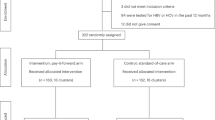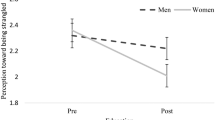Abstract
Provider-initiated HIV testing and counseling (PITC) has rapidly expanded in many countries including Uganda. However, because it provides HIV prevention information without individualized risk assessment and risk reduction counseling it may create missed opportunities for effective HIV prevention counseling. Our objective was to assess the effect of a brief motivational interviewing-based intervention during outpatient PITC in rural Uganda compared to Uganda’s standard-of-care PITC at reducing HIV transmission-relevant sexual risk behavior. We enrolled 333 (160 control, 173 intervention) participants in a historical control trial to test the intervention vs. standard-of-care. Participants received PITC and standard-of-care or the intervention counseling and we assessed sexual risk behavior at baseline and 3 and 6 months follow-up. The intervention condition showed 1.5–2.4 times greater decreases in high risk sexual behavior over time compared to standard-of-care (p = 0.015 and p = 0.004). These data suggest that motivational interviewing based counseling during PITC may be a promising intervention to reduce high-risk sexual behavior and potentially reduce risk of HIV infection.
Resumen
Los servicios de pruebas y asesoramiento del VIH iniciadas por proveedores de cuidado de salud (PITC) se han expandido rápidamente en muchos países, entre ellos Uganda. Sin embargo, debido a que se proporciona información sobre la prevención del VIH sin evaluación del riesgo individual o asesoramiento para reducir el riesgo, esto puede crear oportunidades perdidas para el asesoramiento eficaz de prevención del VIH. Nuestro objetivo fue evaluar el efecto de una breve intervención de entrevista motivacional durante PITC para pacientes ambulatorios en la zona rural de Uganda en comparación con el estándar de atención durante PITC en Uganda para reducir comportamientos sexuales de riesgo para la transmisión del VIH. Incluimos a 333 (160 en el grupo de control y 173 en el grupo de intervención) participantes en un ensayo de control histórico para poner a prueba la intervención vs. estándar de atención. Los participantes recibieron PITC y el estándar de atención o el asesoramiento de intervención y se evaluó el comportamiento sexual de riesgo al inicio del estudio, 3 y 6 meses de seguimiento. La condición de intervención mostró 1.5 a 2.4 veces mayores disminuciones en el comportamiento sexual de alto riesgo sobre el tiempo en comparación con el estándar de atención (p = 0.015 y p = 0.004). Estos datos sugieren que el asesoramiento basado en entrevista motivacional durante PITC puede ser una intervención prometedora para reducir el comportamiento sexual de alto riesgo y potencialmente reducir el riesgo de infección por el VIH.
Similar content being viewed by others
References
Uganda Ministry of Health, ICF International. Uganda AIDS Indicator Survey (AIS) 2011. Kampala: MOH and ICF International; 2012
Uganda Ministry of Health (MOH). Uganda HIV Counselling and Testing Policy. 3rd ed. Kampala: Uganda MOH; 2010.
Becker J, Tsague L, Sahabo R, Twyman P. Provider initiated testing and counseling (PITC) for HIV in resource-limited clinical settings: important questions unanswered. Pan Afr Med J. 2009;3:4.
Holtgrave DR. Costs and consequences of the US centers for disease control and prevention’s recommendations for opt-out HIV testing. PLoS Med. 2007;4(6):e194.
Rennie S, Behets F. Desperately seeking targets: the ethics of routine HIV testing in low-income countries. Bull World Health Organ. 2006;84(1):52–7.
Kiene SM, Bateganya M, Wanyenze R, Lule H, Mayer K, Stein M. Provider-initiated HIV testing in health care settings: should it include client-centered counselling? SAHARA J. 2009;6(3):115–9.
Branson BM, Handsfield HH, Lampe MA, Janssen RS, Taylor AW, Lyss SB, et al. Revised recommendations for HIV testing of adults, adolescents, and pregnant women in health-care settings. MMWR Recomm Rep. 2006;55:1–17.
World Health Organization. Guidance on provider-initiated HIV testing and counseling in health facilities. Geneva: World Health Organization; 2007.
Metsch LR, Feaster DJ, Gooden L, Matheson T, Mandler RN, Haynes L, et al. Implementing rapid HIV testing with or without risk-reduction counseling in drug treatment centers: results of a randomized trial. Am J Public Health. 2012;102(6):1160–7.
Miller M, Rollnick S. Motivational interviewing: preparing people to change addictive behavior. New York: Guilford Press; 1991.
Bell A, Rollnick S. Motivational interviewing in practice: a structured approach. In: Rotgers F, Keller D, editors. Treating substance abuse: theory and technique. New York: Guildford; 1996.
Rollnick S, Mason P, Butler C. Health behavior change. 2nd ed. Edinburgh: Churchill Livingstone; 2000.
Lundahl BW, Kunz C, Brownell C, Tollefson D, Burke BL. A meta-analysis of motivational interviewing: twenty-five years of empirical studies. Res Soc Work Prac. 2010;20(2):137–60.
Rubak S, Sandbaek A, Lauritzen T, Christensen B. Motivational interviewing: a systematic review and meta-analysis. Br J Gen Pract. 2005;55(513):305–12.
Naar-King S, Parsons JT, Johnson AM. Motivational interviewing targeting risk reduction for people with HIV: a systematic review. Curr HIV/AIDS Rep. 2012;9(4):335–43.
Uganda Ministry of Health (MOH). Routine HIV Testing and Counseling Manual. Kampala: MOH; 2006.
Nova Research Company. Questionnaire Development System (QDS), version 2.6.1. Bethesda.
Fisher JD, Fisher WA, Cornman DH, Amico RK, Bryan A, Friedland GH. Clinician-delivered intervention ruring routine clinical care reduces unprotected sexual behavior among HIV-infected patients. J Acquir Immune Defic Syndr. 2006;41(1):44–52.
Cornman DH, Christie S, Shepherd LM, MacDonald S, Amico KR, Smith LR, et al. Counsellor-delivered HIV risk reduction intervention addresses safer sex barriers of people living with HIV in KwaZulu-Natal, South Africa. Psychol Health. 2011;26(12):1623–41.
Fisher JD, Cornman DH, Shuper PA, Christie S, Pillay S, MacDonald S, et al. HIV prevention counseling intervention delivered during routine clinical care reduced HIV risk behavior in HIV-infected South Africans receiving antiretroviral therapy: the izindlela zokuphila/options for health randomized trial. J Acquir Immune Defic Syndr. 2014;67(5):499–507.
Fisher JD, Fisher WA. Changing AIDS-risk behavior. Psychol Bull. 1992;111(3):455–74.
Weinhardt LS, Carey MP, Maisto SA, Carey KB, Cohen MM, Wickramasinghe SM. Reliability of the timeline follow-back sexual behavior interview. Ann Behav Med. 1998;20(1):25–30.
IBM Corp. IBM SPSS Statistics for Windows, Version 20.0. Armonk: IBM Corp; 2011.
Cornman DH, Kiene SM, Christie S, Fisher WA, Shuper PA, Pillay S, et al. Clinic-based intervention reduces unprotected sexual behavior among HIV-infected patients in KwaZulu-Natal, South Africa: results of a pilot study. J Acquir Immune Defic Syndr. 2008;48(5):553–60.
Fisher JD, Cornman DH, Shuper PA, Christie S, Pillay S, Macdonald S, et al. HIV prevention counseling intervention delivered during routine clinical care reduces HIV risk behavior in HIV-infected South Africans receiving antiretroviral therapy: the izindlela zokuphila/options for health randomized trial. J Acquir Immune Defic Syndr. 2014;67(5):499–507.
Mantell JE, Smit JA, Exner TM, Mabude Z, Hoffman S, Beksinska M, et al. Promoting female condom use among female university students in KwaZulu-Natal, South Africa: results of a randomized behavioral trial. AIDS Behav. 2015;19(7):1129–40.
Wanyenze RK, Kamya MR, Fatch R, Mayanja-Kizza H, Baveemo S, Szekeres G, et al. Abbreviated HIV counselling and testing and enhanced referral to care in Uganda: a factorial randomised controlled trial. Lancet Glob Health. 2013;1(3):e137–45.
Apodaca TR, Longabaugh R. Mechanisms of change in motivational interviewing: a review and preliminary evaluation of the evidence. Addiction. 2009;104(5):705–15.
Weinhardt LS, Carey MP, Johnson BT, Bickham NL. Effects of HIV counseling and testing on sexual risk behavior: a meta-analytic review of published research, 1985–1997. Am J Public Health. 1999;89(9):1397–405.
Fonner VA, Denison J, Kennedy CE, O’Reilly K, Sweat M. Voluntary counseling and testing (VCT) for changing HIV-related risk behavior in developing countries. Cochrane Datab Syst Rev. 2012; (9). doi/10.1002/14651858.CD001224.pub4/abstract.
Marks G, Crepaz N, Senterfitt JW, Janssen RS. Meta-analysis of high-risk sexual behavior in persons aware and unaware they are infected with HIV in the United States: implications for HIV prevention programs. J Acquir Immune Defic Syndr. 2005;39(4):446.
Fisher JD, Cornman DH, Shuper PA, Christie S, Pillay S, Macdonald S, et al. HIV prevention counseling intervention delivered during routine clinical care reduces HIV risk behavior in HIV-infected South Africans receiving antiretroviral therapy: the izindlela zokuphila/options for health randomized trial. J Acquir Immune Defic Syndr. 2014;67(5):499–507.
UNAIDS. 90-90-90 An ambitious treatment target to help end the AIDS epidemic. Geneva: 2014.
Acknowledgments
This research was supported by the National Institute of Mental Health (K01 MH083536). The authors thank Kenneth Mayer for input into the study design, Michael Stein for providing feedback on an earlier version of this manuscript, Katelyn Sileo for editorial assistance, Harriet Nantaba and Hajara Kagulire for assistance with data collection, Joeseph Jasperse and Kia Jayaratne for assistance with the day-to-day study management, Jane Ngamita, John Bosco Nduugutse, and Kagga Twaahah for their work as laboratory technicians/HIV counselors, Clovice Nyakatura for logistics assistance, and all of the Gombe Hospital staff for their support.
Funding
Supported by the National Institute of Mental Health (K01 MH083536).
Author information
Authors and Affiliations
Corresponding author
Rights and permissions
About this article
Cite this article
Kiene, S.M., Bateganya, M.H., Lule, H. et al. The Effect of Motivational Interviewing-Based Counseling During Outpatient Provider Initiated HIV Testing on High-Risk Sexual Behavior in Rural Uganda. AIDS Behav 20, 1928–1936 (2016). https://doi.org/10.1007/s10461-016-1377-y
Published:
Issue Date:
DOI: https://doi.org/10.1007/s10461-016-1377-y




